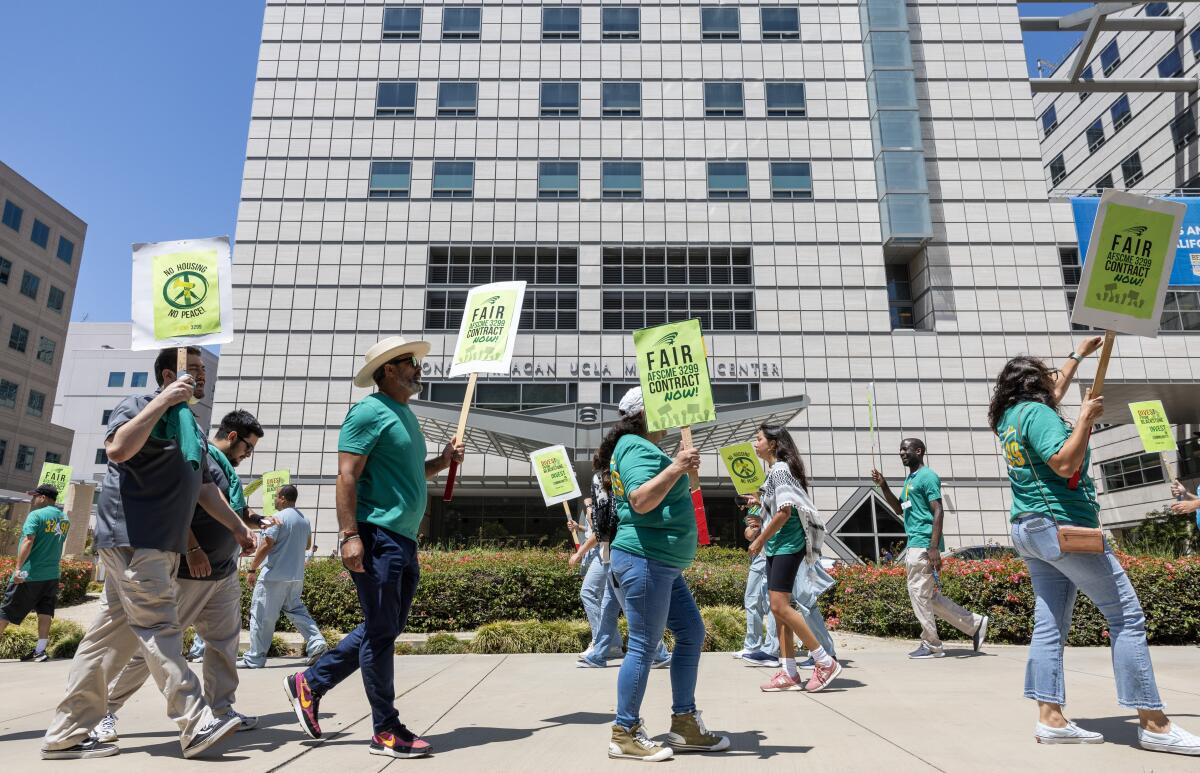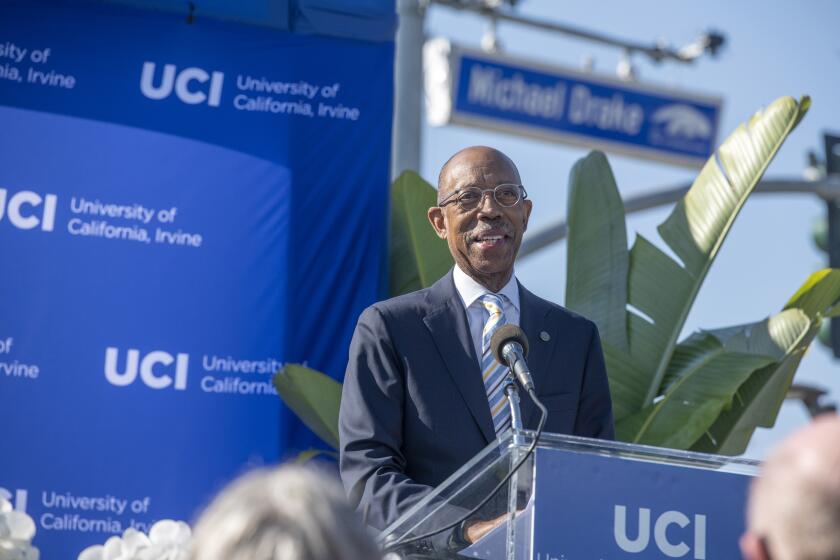UC service workers want more than a pay hike. They want housing aid amid high costs

- Share via
Hundreds of UC healthcare and campus service workers converged in front of Ronald Reagan UCLA Medical Center to picket during their lunch break Wednesday, demanding higher wages and investment in affordable housing solutions.
The informational picket was one of five across the UC campuses organized by AFSCME Local 3299, which represents more than 30,000 workers, who are among the lowest-paid in the UC system. These union members are patient care technical workers, custodians, food service employees, security guards, secretaries and others who keep hospitals and campuses running behind the scenes,
For the record:
3:28 p.m. Aug. 1, 2024A previous version of this article referred to the California Public Employment Relations Board as the California Employment and Labor Relations Board.
The union has been bargaining with UC for new contracts for most of its members since January. Last week, the California Public Employment Relations Board declared bargaining to be at an impasse. On Thursday, the contract for patient care technical workers expires; the service worker contract ends in October.
“We are picketing because ... the contract is expiring, and the university has still failed to address the fundamental problem that we’ve been raising to them, frankly, before the contract — the issue of housing,” said Liz Perlman, AFSCME 3299 executive director, who said many union members don’t make enough money to pay for the high cost of housing. In addition to higher wages, the union is pushing the university to include funds for housing aid in a new contract.
The university has offered a $25 minimum wage with 5% wage increases across the board by next July, among 25 other proposals, UC said in a July 30 news release.
University of California President Michael V. Drake announced Wednesday he would step down at the academic year, after managing the pandemic, policing, protests and budget woes during a challenging four-year tenure.
This matches the wage increase proposed by the union in a 2023 report.
However, a new report by AFSCME researchers took a closer look at the effect of the housing crisis on many union members and found that workers will need more than just those higher wages to find affordable housing close to campus.
With a median hourly wage of about $30, more than two-thirds of union employees meet the U.S. Department of Housing and Urban Development’s standard of “low” or “very low” income, double the number in 2017, according to the report.
Since 2017, the number of service and patient care workers who are eligible for federal housing vouchers has nearly tripled to 9,400, encompassing all workers at UC Santa Barbara and UC Santa Cruz and 76% at UC San Diego, the union report said. In a push to expand their contract beyond wage increases, the union wants the university to create housing assistance funds for low-wage employees.
Erika Djordjevic has experienced housing insecurity. A student and patient scheduler at UC San Diego, Djordjevic said she and her 7-year-old son had to move in with her parents after a divorce left her with an apartment she could not afford on her own. Before taxes, she makes less than $5000 a month.
“The market makes it unrealistic for a single-income person to be able to buy a house or rent an apartment at this day and age. It’s impossible,” Djordjevic said. “And it’s sad because we work for a great company but they’d rather build multimillion-dollar buildings than give us at least a good way of living.”
Djordjevic has applied to three different federal housing assistance programs — but at No. 168 on the wait list, she isn’t holding her breath.
On the flip side, UC San Francisco shuttle driver Carmen Lee has received a government housing voucher — but she applied 21 years ago, when she was unhoused, had a child and was fast-tracked past 15,000 others because of the “desperate” nature of her situation. She fears that if she lost her current housing, her circumstances would once again be precarious.
“With my salary at UC, and the high inflation right now, really, where would we go?” she asked.
Union members pointed to a program at UC Davis that helps union workers with housing near the university’s new satellite development and research hub, Aggie Square, as an example of the type of housing assistance they are seeking in their contract.
The $5-million fund was created in a partnership between the union, the university and the city and will support housing stability and eviction protections for eligible households, with AFSCME members receiving priority.
Months behind on rent and facing eviction, UC patient service representative Darian Garnett said the program gave her a one-time $5,000 grant to help with missed rent payments.
“That’s an example where there’s a precedent,” said AFSCME researcher Owen Li, adding that the university provided housing assistance to workers most in need.
In response, Missy Matella, associate vice president for systemwide employee and labor relations, said that by providing “generous wage increases,” UC gives employees agency over their money.
“The University is dedicated to supporting its employees and understands that many face concerns with the high cost of housing,” Matella said. “UC believes, however, that the best way to address those concerns is by providing its employees with wage increases and allowing them to choose how to use those funds best.”
More to Read
Sign up for Essential California
The most important California stories and recommendations in your inbox every morning.
You may occasionally receive promotional content from the Los Angeles Times.












